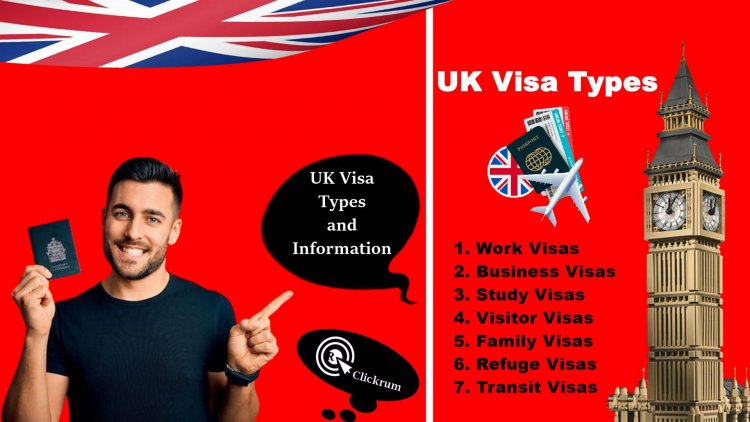UK Visa Types and Information – Which One is Right for You?
The United Kingdom has one of the most advantageous economies, and it’s great to see more and more people moving there to study or work. However, if you are not from an EU country, or have never been to the UK before, you will need to apply for a visa before entering the country legally. For example, if you are going there as a student, you need an academic visa that allows you to stay in the country until your studies are over. On the other hand, if you want to work there after graduation, you need a work visa that permits this type of stay.

The United Kingdom attracts visitors from all over the world and with good reason. From the busy streets of London to the picturesque rolling hills of the countryside, there are few countries in the world that boast such diversity and natural beauty packed into such a small space. If you’re moving to the UK, whether it’s to visit or to live permanently, you’ll need some information about which visa type best suits your particular circumstances. Fortunately, this guide will help you to understand what you need to know about each visa category and decide which one might be right for you!
If you’re looking to move to the UK, you’ve likely heard about visas and wondered what type of visa is right for you. The UK has many different types of visas, each with its own requirements, restrictions, and costs attached. Once you understand the basics of UK visa types and the types of visas available, it will be easier to find the visa that best suits your needs and those of your family. Here are some common visa types in the UK as well as information on who can apply for them and what they entail.
There are different reasons why people want to apply for a UK visa, such as:
- To work and to do business
- To study
- For short stays and tourism
- To join family members who are already in the UK
- To transit through the UK to another country
- To live permanently
- As a refugee or as someone who needs humanitarian protection
- As a stateless person
- As someone who needs permission to stay
Who Needs a UK Visa?
Those who want to visit or work in the UK must first apply for a UK visa if one isn’t already provided by their country of citizenship. The requirements vary depending on your country of origin and your reason for travel. For example, citizens of Australia are able to enter as a part of their Commonwealth status, while residents of Hong Kong require clearance from their local British consulate.
There are several types of UK visas based on residence status: tourist visas, study visas, work visas (including working holiday visas), family settlement visas, and business entrepreneur migrants’ visas. Most travelers will need one type over another depending on where they are going and how long they plan to stay.
How to Apply for a UK Visa?
The first step to obtaining a UK visa is to contact your local British Embassy, High Commission, or Consulate. You’ll need to make an appointment ahead of time, which can take some time because you’ll be competing with other applicants.
After your interview, you’ll get a decision on whether you’re eligible for a visa within two weeks. If all goes well, you’ll receive your UK visa in six weeks. Keep Reading...
When Should I Apply for a UK Visa?
UK visas should be obtained before traveling to the UK. If you’re traveling from a country in Europe, Africa, or Asia, apply at least three months in advance of your trip. Applications received less than three months in advance will most likely take longer to process than if you applied earlier. To save money on travel and lodging expenses, apply for your visa as early as possible.
Read More: UK Business Investor Visas for Foreigners in 2022: How to Secure Yours
Apply six months or more ahead of time if you are applying from North America or South America—it can take two to four weeks to get an appointment with a visa application center; that’s a lot of wasted vacation days! Be sure to book your airline tickets well in advance so they don’t expire while you wait for a decision on your application.
What are the Required Documents for UK Visa?
The documents required to apply for a UK visa depend on your nationality. For example, US passport holders will need a valid passport and completed visa application form, as well as two identical photos of themselves. Chinese nationals must complete all sections of their UK visa application in both English and Chinese.
European citizens don’t need to provide photos if they are aged 18 or older (so long as their biometric chip is embedded in their passport) but must provide proof of travel insurance with at least $50,000 in coverage unless exempted from doing so by law.
What is the Points-Based System (PBS)?
The Points-Based System (PBS) allocates visas based on your skills, qualifications, age, family circumstances, and English language ability.
In some cases it could be a stand-alone route to settlement; in others, it can lead to a visa that leads to settlement. It's a very flexible system with options for employment, study, or self-employment. Keep reading...
UK Visa Types
There are different reasons why people want to apply for a UK visa. That is why the United Kingdom has an organized visa system based on the purpose of visitors under multiple visa types.
Here are the UK visa types:
- Work Visas.
- Business Visas.
- Study Visas.
- Visitor Visas.
- Family Visas.
- Refuge or Settlement Visas.
- Transit Visas.
Business Visas
A business visa allows non-EU/EEA nationals to visit or work in Britain for a specific period of time. It usually has conditions attached to it, such as a requirement that you return home at night and spend only a certain number of days in the UK each year. There are two types of business visa: The Tier 1 Investor visa, which grants permission to live in Britain if you invest £2 million into UK government bonds or businesses; The Tier 1 Entrepreneur visa, which gives permission to live in Britain if you can demonstrate that your business will generate substantial economic activity or employ more than 10 British nationals within three years of launch.
Work Visas
There are four main types of work visas available to non-EU nationals: Tier 2, Tier 5, Intra-Company Transfer (ICT) Visas, and Work Permits. In most cases, these visa options require a UK job offer as well as proof that you can support yourself financially. Most individuals looking to obtain a work visa will apply through their employer if they have one in mind; it’s often easier for them to sponsor your entry into the country rather than go through a complicated application process themselves. However, you may be able to apply on your own in certain situations. For example, you might be able to obtain an ICT or Work Permit without an employer lined up but only if you’re coming from outside of Europe with a specialized skill set.
Read More: United Kingdom Visa Renewal and UK Visa Extension
Categories of work and business visas
- Highly qualified foreigners:
- Global Talent Visa
- Skilled foreign workers with a job offer in a shortage area
- Tier 2 (General) Visa
- Tier 2 (Intra-company Transfer) Visa
- Tier 2 (Sportsperson) Visa
- Tier 2 (Minister of Religion) Visa
- Youth mobility and temporary foreign workers
- Tier 5 (Temporary Worker) Visa
- Tier 5 (Youth Mobility Scheme) Visa
- Other:
- Croatian National Registration Certificate
- Domestic Workers in a Private Household Visa
- Exempt Vignette Visa
- Turkish Worker Visa
The UK Business Visa types are the following:
- Tier 1 Entrepreneur Visa
- Tier 1 Graduate Entrepreneur Visa
- Tier 1 Investor Visa
- Turkish Businessperson Visa
Student Visas
A student visa allows you to study in a UK university or college. It does not allow you to work during your stay. If you wish to work, you will need a work permit as well. Also known as a Tier 4 visa, it allows you to live in UK for up to five years before moving on to further studies or employment.
The following are some of its requirements:
- Tier 4 (Child) Student Visa
- Tier 4 (General) Student Visa
- Short Term Study Visa
Transit Visas
People who enter or transit through the UK temporarily may not be required to obtain a visa. However, you may still need a visa if you are transiting through the UK under any of these conditions: · Your journey to your final destination does not involve UK · Your stay in the UK is expected to last more than 24 hours. If so, you will need an airport transit visa.
 Your nationality requires that your passport must be valid for at least six months after arrival in the UK (and can require two months if traveling from certain countries). For example, citizens of some Eastern European countries must have at least six-month validity on their passports upon arrival in the UK.
Visitor visas
If you are planning a trip to England, it might be good to know that different types of UK visas exist. For example, if you have plans to stay in England for more than six months, you’ll need a visitor visa. Visitor visas are also required for trips to visit friends or family members who live in England.
In order to apply for a visitor visa, however, travelers must already have proof of their ties back home (i.e., job, house). It’s also important to note that visitors from non-EU countries do not automatically qualify for six-month stays with tourist visas; they will first need an Electronic Visa Waiver (e-Visa) which can be obtained online at least three days before travel.
Categories visitor visas
- Marriage Visitor Visa
- Parent of Tier 4 (Child) Student Visa
- Permitted Paid Engagement Visa
- Short-term Study Visa
- UK Visitor Visa
- Visa for a Chinese Tour Group
Family Visas
If you’re married to a British citizen or have children who are British citizens, you may be eligible for a UK family visa. These visas let you join your loved ones in Britain. Although they are initially issued in limited numbers each year, it is possible to switch to another category after being approved. For example, if you come on a work visa but find employment elsewhere once you arrive, it might be easier—and faster—to apply as a spouse or partner instead of as an employee.
Read More: UK Innovator Visa Application: Start a Business in the UK in 2022
Categories of family visas
- UK Spouse visa
- UK Parent visa
- UK Child visa
Refugee Visa
If you're in danger of persecution because of your race, religion, nationality, political opinion or membership in a particular social group you should apply for refugee status. It's usually not possible to apply directly from inside your home country - if you do so, there's a risk that you'll be forced to return home before your application has been processed.
Instead, seek asylum at an embassy or other high commission representing your country abroad - they'll normally be able to process your application while you remain outside of your home country. As with all UK visa applications, whether made outside or inside of the UK, once refugee status has been granted it can be revoked if there are significant changes in circumstances.
UK Residence Permits
There are multiple types of UK residence permits: permanent, temporary (including work, study, marriage), and family members of EEA nationals. Each permit has its own requirements and privileges, so be sure to check which one is right for you. Here’s a breakdown of each permit type.
Indefinite Leave to Remain
The UK Settlement permit also known as Indefinite Leave to Remain, is for those who have been living in the UK for a long period with a temporary visa, and now want to receive a permanent one. The visa applies to people who have lived out of the UK for at least 2 years and now want to return, or their passport was lost.
Foreigners who already live in the UK with e refugee or humanitarian status and want to settle there permanently or for family reunion. Most of these visas condition the applicant to have lived minimum 5 years in the United Kingdom.
EEA Residence Permits
EEA Residence Permits:
- EEA Residence Card
- UK Registration Certificate – EEA (QP)
- UK Permanent Residence Card – EEA (PR)
- EEA family permit related to the derivative right of residence
- EEA family permit related to the Surinder Singh
- EEA family permit related to retained rights of residence
- Certificate of entitlement for the right to abode in the UK
Other Residence Permits
UK Residence permits serve to gain temporary residence in the UK.
Categories
- Returning Resident Visa
- Biometric Residence Permit (BRP)
- Residence Permit for Commonwealth Citizens
- Settlement visa as a Refugee or for Humanitarian Protection
Can I Get a UK Visa If I Have a Criminal Record?
If you've ever had a run-in with law enforcement (civil or criminal), whether it was a minor traffic violation or a criminal charge, you might wonder if your record will bar you from getting a UK visa. Rest assured, there are many paths to obtaining UK entry clearance as long as you’re eligible in other ways—and even if you do have an arrest or conviction on your record, your chances of receiving a UK visa may not be entirely out of reach.
Whether or not your arrest or conviction matters depends on which type of visa you're applying for; while some types allow people with criminal records to enter and remain in Britain, others may require that applicants never been convicted of any offense whatsoever.
Do I Need to Register With the Police?
If you're coming to Britain to work, study or join your family, it's very likely that you'll need a visa. If so, do you also need to register with your local police station in Britain? The short answer is that you only need to register if your visa allows you to stay longer than 6 months.
In most cases, when applying for a UK visa, applicants are not permitted to stay in Britain longer than 6 months. As such, registering with local authorities will have no benefit during your time in Britain. However, there are some circumstances where someone would need a visa that allows them to stay longer in Britain.
Can I Travel Abroad While I Am in the UK With a Valid Visa?
If you are in possession of a valid visa, you may still travel abroad while in the UK. When leaving Britain to go abroad, however, travelers will be required to produce documentation showing that they have a valid visa before being allowed to return. Although there are no specific rules regarding how much time can be spent outside of Britain with a valid visa as long as it is granted by a specified date, officials typically ask that visitors return within six months if they don't plan on reapplying.
Because visas can be difficult and expensive to acquire, individuals who plan on leaving and returning often choose not to renew their current visa but instead apply for one that allows multiple entries into Britain. This helps avoid having to acquire new documents each time individual leaves.
Traveling to Europe
As a tourist, you can visit Europe as often as you like. There are several types of tourist visas, which let you stay in different countries for varying amounts of time. Some visas require that you have an invitation from a hotel or host; others allow travel anywhere within a country. With careful planning, most people can use tourist visas to live in Europe.
Traveling to USA
If you have recently applied for a UK visa or are an existing holder of a valid UK visa, you might be wondering if it is possible to visit USA from UK with a UK visa. The answer to that question depends on what type of UK visa you hold.
If you want to travel to USA using your UK visa, then most likely your UK visa will allow entry into USA as well as other countries in Europe as well. If that's not your aim then there are various types of visas available for those who wish to travel only within Europe under one single visa.
Conclusion
Although it may seem overwhelming at first, with a little research, you can make an informed decision about which UK visa type is right for you. We hope that our guide has given you a better understanding of what to expect from your UK visa application; if not, please feel free to ask us anything in the comments section below. We’ll do our best to answer your questions. Good luck!
Useful resources
The Netherlands Citizenship Program
Best University to Study in Australia
The Germany Citizenship Program
Best University to Study in Germany













